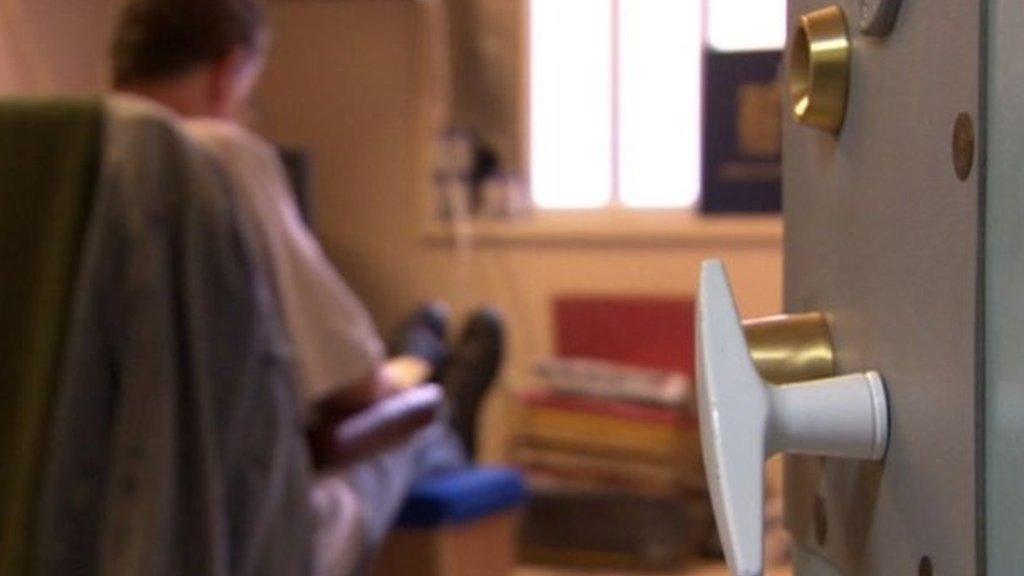Sex offender treatment in prison led to more offending
- Published

HMP Whatton is one of the prisons used to hold and treat sex offenders
The main sex offender treatment programme for England and Wales has been scrapped after a report found it led to more reoffending.
Researchers found prisoners completing the programme were slightly more likely to offend than a control group.
The Ministry of Justice (MOJ) replaced the scheme in March after research confirmed evidence of its weaknesses.
The main programme to psychologically treat the highest-risk offenders has also been replaced, the ministry said.
The MOJ confirmed the change in treating sex offenders following publication on Friday of its own study which suggested the Core Sex Offender Treatment Programme (SOTP) could be making the situation worse.
The scheme, designed to challenge the behaviour of male sex offenders with psychological techniques to change their thinking, was first approved in 1992.
Researchers followed what happened to 2,562 prisoners who took part in the 180 hours of group sessions before their later release from prison.
They then compared their behaviour over the following years with more than 13,000 comparable offenders.

"More treated sex offenders committed at least one sexual re-offence [excluding breach of conditions of release] during the follow-up period when compared with the matched comparison offenders (10% compared with 8%)," said the study., external
"More treated sex offenders committed at least one child image re-offence when compared with the matched comparison offenders (4.4% compared with 2.9 %).
"The results suggest that while Core SOTP in prisons is generally associated with little or no changes in sexual and non-sexual reoffending ... the small changes in the sexual reoffending rate suggest that either Core SOTP does not reduce sexual reoffending as it intends to do, or that the true impact of the programme was not detected.
"Group treatment may 'normalise' individuals' behaviour. When stories are shared, their behaviour may not be seen as wrong or different; or at worst, contacts and sources associated with sexual offending may be shared."
It's not clear why it failed
An earlier version of the scheme, in place in 2000, had appeared to reduce the offending of medium-risk men.
But a study seven years later, after Core SOTP had been expanded, suggested the sessions had become too generic and based around a "detailed manual", rather than tailored to each offender.

Treatment programmes for sex offenders
Sex offenders can receive therapy in prison and in the community
Core programme devised in 1992 - but revised over years as evidence of effectiveness complex
Main SOTP scheme rolled out to more prisons in 2000s - but now found to have failed
Two new schemes have been accredited as replacements, having been devised from latest research

The Ministry of Justice began to review the schemes in 2010 amid emerging evidence of what was working - and concerns about SOTP's effectiveness. On Friday it confirmed it had replaced Core SOTP in March - a decision that was not announced at the time - and the extended version of the scheme for high-risk offenders in March.
Offenders who would have originally taken part in those schemes were now on programmes called "Horizon" and "Kaizen". While the new schemes still involve group sessions, the inmates are no longer required to discuss their own offences.
Horizon, aimed at medium-risk offenders, aims to teach them "to manage unhealthy sexual thoughts and behaviours" and make other positive changes to their lives.
Kaizen, a Japanese word used in business to refer to continual improvements in performance, is focused on the highest risk offenders.
"We keep treatment programmes under constant review to reduce reoffending and protect the public," said the statement.
"The treatment of sex offenders is a complex issue, subject to international scrutiny and research. In the UK, we have been evaluating our Sex Offender Treatment Programmes since before 2003.
"We have discontinued two of the eight programmes and replaced them with new courses as part of this process. These new programmes will be monitored closely."
- Published30 March 2015
